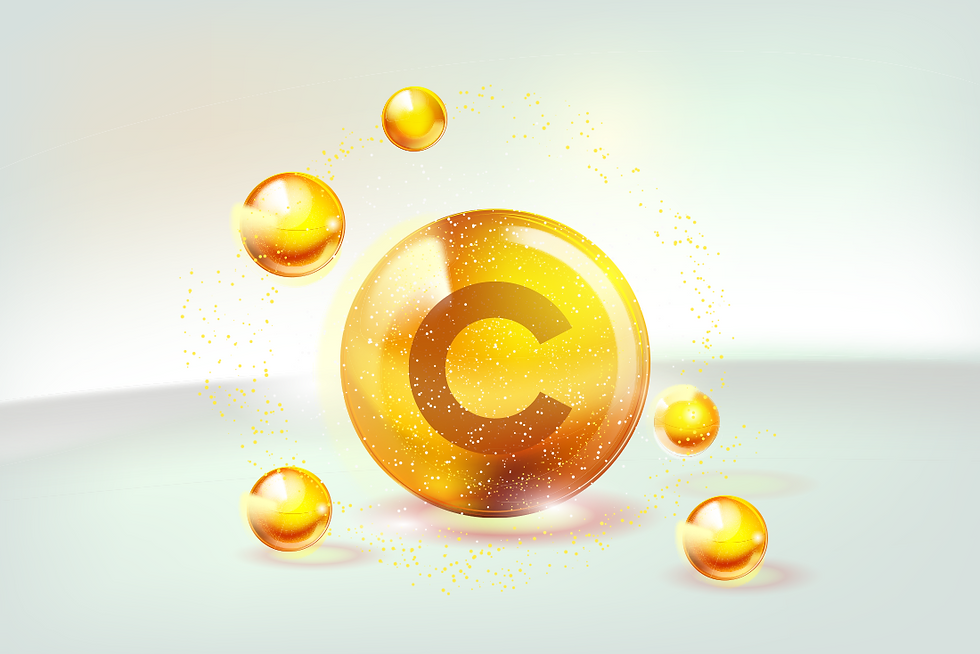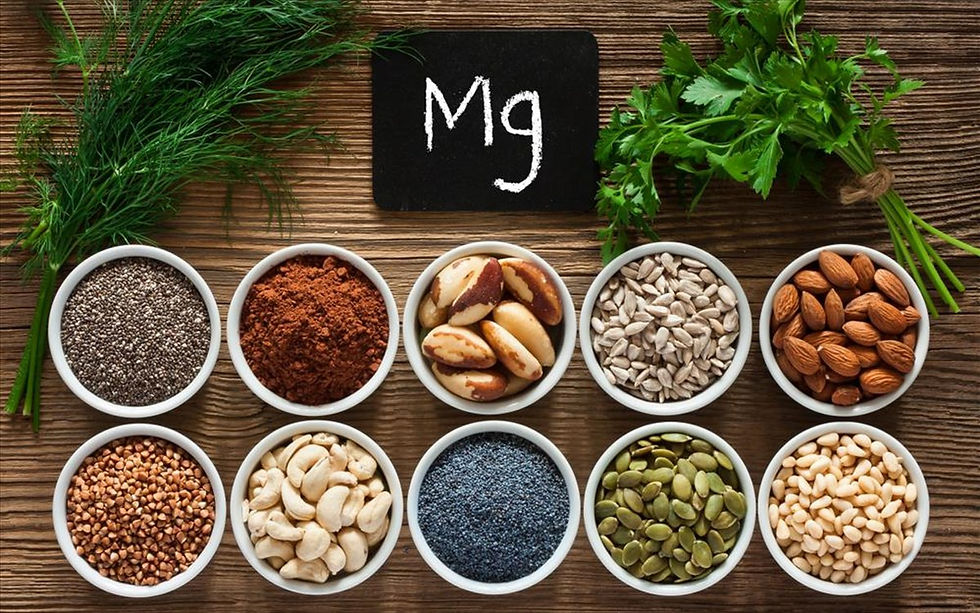6 Supplements Against the Infections they Cause Thyroid Disorders
- By HealthRevolution

- Apr 12, 2020
- 5 min read
Updated: Jun 1, 2020
For a better understanding read the first part of the article: The Real Underlaying Cause of Hypothyroidism
The main supplements against infections that cause thyroid disorders. How they work against infections and recommended doses.

Vitamin C
Vitamin C is essential for the conversion of thyroid hormone. Although popular as an immune booster, it has recently been shown to be a powerful weapon against sepsis infections, which kills millions of people worldwide.
According to a recent review of the literature on vitamin C and its effect on infections, 148 animal studies have shown its ability to fight infections from bacteria to protozoa and viruses. The EBV virus does not seem to be an exception. A study found that EBV virus levels were lower in patients with higher levels of vitamin C in their blood after intravenous treatment with vitamin C. Researchers have concluded that high doses of vitamin C have a positive effect on both the course of the disease and the levels of viral antibodies.
However, in addition to intravenous vitamin C, liposomal vitamin C is an option, as it is more absorbed and less likely to irritate the digestive system in high doses.
Recommended daily dosage: The above study used 7.5-50 grams, while some therapists recommend doses of liposomal vitamin C up to 6 grams. Consult your doctor to determine the correct dose that will not affect the intestine (ie determine how much vitamin the body can take before soft stools are induced).

Vitamin D
Studies have linked vitamin D deficiency and autoimmune thyroid conditions.
Recommended daily dose: Vitamin D Council, a non-profit medical organization that aims to inform about vitamin D, considers that any dose below 40ng / mL is insufficient. Adults are advised to take 5,000 IU of vitamin D daily either through direct sun exposure on unprotected skin or by supplementation with vitamin D3.

Ιodine
Thyroid-secreting hormones are combinations of iodine and amino acid tyrosine. Iodine deficiency means that the thyroid gland cannot make its basic hormones.
The World Health Organization recognizes iodine deficiency as a huge global problem, and recent studies have found that the majority of British women of childbearing age or during pregnancy develop iodine deficiency, which is worrying because iodine is essential for development of the fetal brain in utero and iodine deficiency is a major cause of reduced intelligence in children.
As a result of recent studies, the UK was recently ranked as the seventh country to iodine deficiency worldwide. The same mass shortage exists in other countries, such as the United States, but the iodine trace elements added to the salt here have covered the problem by eliminating the most obvious cases of goiter - where the thyroid shows inflammation and swelling visible on the neck.
Certain foods, such as raw turnips, cabbage, soybeans and peanuts, prevent the use of iodine. But holistic doctor David Braunstein, author of the book: "Iodine: Why You Need It, Why You Can't Live Without It" believes that our increasing exposure to toxic chemical substances halides are much more likely culprit for the high rates of iodine deficiency.
Chlorine and its derivatives (in drinking water), bromine (added to bread to make the dough more elastic and in pesticides and plastics) and fluorine (in water and toothpaste) bind to receptors for the iodine in the thyroid gland and inhibit the production of thyroid hormones. Major dietary sources of iodine are sea salt, seafood such as shrimp and cod and dairy products.
Conventional medicine does not agree with the idea of administering iodine supplementation in people with thyroid disorders, which some believe could exacerbate autoimmune attack. Instead, Braounstain stresses: "I can say that it is impossible to treat thyroid disease where there is iodine deficiency in the body and this includes the autoimmune thyroid disorder"
Recommended daily dose: Although the recommended daily US dose is 150 micrograms (mcg) of iodine / day for adults and 220 mcg / day for the pregnant women, the alternative practitioners suggest doses ranging from 325mcg in kelp supplements to 12.5 milligrams ( equivalent to 12,500 mcg) of iodine. If you decide to take high doses through a nutritional supplement, go for help to a health professional to monitor thyroid markers and avoid taking supplements before bedtime.

Selenium
Selenium is very important for thyroid function. Some studies have shown that supplementing selenium may reduce the levels of antibodies that attack the thyroid proteins in blood, however still not clear whether this change in antibody levels lead to tangible improvements in clinical symptoms. Nevertheless , examination of the isolated selenium can be misleading as it is the simultaneous intake of other minerals, including iodine, which helps to improve the balance of thyroid hormones.
Some physicians normally prescribe selenium supplementation in patients with thyroid diseases. However, caution is needed because the excess selenium can cause symptoms such as fatigue and gastrointestinal problems, as well as hair loss and white spots on the nails.
Suggested daily dosage: The daily dose of 200 micrograms is quite common (400 mcg deemed safe upper limit), but if you prefer to use a natural source, eat two brazil nuts a day, which proved to have the same results by taking 100 mcg to supplement.

Thiamine
Thiamin (vitamin B1) is important for the conversion of carbohydrates into energy and digestion of proteins and fats. In an interesting study, three patients with autoimmune thyroiditis Hashimoto exhibited partial or complete regression of fatigue within hours or days of receiving high-dose thiamine (600 mg daily by mouth).
Individuals with autoimmune disorders including thyroid diseases typically are deficient in this vitamin, but mild thiamine deficiency is not detected by the current standard tests. Women in the above study were not deficient in thiamine.
Suggested daily dosage: The standards contain additives usually 1-2mg thiamine. Since Thiamine is water soluble, does not accumulate in the body to toxic levels, however, consult a professional before taking high doses.

Magnesium
Magnesium is essential for iodine intake. A 2017 study in Canada found that almost 1/6 of adults and adolescents had blood magnesium levels below what would be considered severe magnesium deficiency (below 0,75mmol / L).
Magnesium offset from calcium and even a small increase in calcium intake has been shown to exacerbate the lack of magnesium, so avoid taking calcium supplements if you are looking to boost magnesium.
Suggested daily dosage: Up to 600mg per day of magnesium. This will reduce the symptoms of anxiety and palpitations, constipation, insomnia and cramps in the short and long term will improve the condition of the thyroid.
The Drug Does Not Always Work
The thyroid secretes an equilibrium two hormones called thyroxine (T4) and triiodothyronine (T3) in blood, and they regulate the metabolism, body temperature, and many other critical functions.
For those with subnormal thyroid (hypothyroidism), levothyroxine is the drug of choice. In fact, its use is so widespread that it was the number one most prescribed drug in the United States for five years and the third most prescribed drug in the United Kingdom.
But the fact is that the drug does not always work. Many studies have examined the "residual symptoms" for those taking levothyroxine. A review published in 2015 acknowledged that "the available clinical evidence indicates that levothyroxine monotherapy is not an adequate replacement for universal thyroid function."
A 2017 study published in the journal New England Journal of Medicine showed that levothyroxine is no more effective than a placebo in elderly adults with hypothyroidism who are subclinical, which means no apparent symptoms.
The head researcher at the University of Glasgow, Professor David Scott calls the drug "a waste of money and a waste of time" after his team examined the levothyroxine in a group of 737 patients with an average age of 74-year old, who were diagnosed with subclinical hypothyroidism and found that there were no obvious benefits.
Symptoms such as poor muscle strength, thinking speed, weight gain and circulatory problems were the same whether the patient received the drug or a placebo, although resulted physiological effects on thyroid blood tests.







Comments